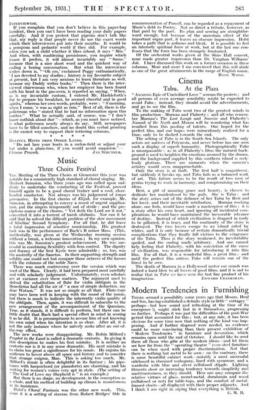Music
Three Choirs Festival
Top: Meeting of the Three Choirs at Gloucester this year was notable for a consistently high standard of choral singing. Mr. Herbert Sumsion, who three years ago was called upon sud- denly to undertake the conducting of the Festival, proved himself again to be a good choral trainer and a cool, clear- headed conductor. Not always was his judgement of tempo persuasive. In the first chorus of Elijah, for example, Mr. Sumsion, in attempting to convey a mood of urgent supplica- tion, put the singers temporarily out of stride ; and the pre- cipitous course of the chorus, " Yet doth the Lord see it not," converted it into a torrent of harsh sibilants. Nor can it be said that he solved the difficult problem of the slow movement of 'Sibelius' Second Symphony. For all that, he did leave a total impression of sensitive musicianship. His greatest task was in the performance.of Bach's B minor Mass. (This, incidentally, was given at the Wednesday morning session without a break, a welcome innovation.) In my own opinion, this was Mr. Sumsion's greatest achievement. He was suc- cessful in combining flexibility with firm control. The dignity and fluency of the first Kyrie were admirable ; so, too, was the austerity of the Sanctus. In their supporting strength and solidity one could not but compare those octaves of the basses with the columns of the noble Nave.
There was much controversy over the version which was used of the Mass. Clearly, it had been prepared most carefully and with scholarly judgement. Unfortunately, even scholars are at variance over these matters. The argument used to defend the substitution of flute for violin obbligato in the l3enedictus had all the air of a case of simple deduction, my dear Watson." It was not so simple as all that. Flute-tone may have been well in keeping with the mood of the music, but there is much to indicate the inherently violin quality of the obbligato. Then, again, it was difficult to subscribe to the new arrangement of the accompaniment of the Quoniam. True, as it stands, it is difficult to perform, but there can be little doubt that Bach had a special effect in mind in scoring it as he did. It is presumptuous to accuse him of not knowing his own mind when his intention is so clear. After all, it is not the only instance where he naively seeks after an out-of- the-way effect. The new works were disappointing. Mr. Robin Milford's Prophet in the Land is called a dramatic oratorio. In giving it this description he makes •his first mistake. It is neither an oratorio nor is it in any sense dramatic. His next mistake is to claim too great a significance for his music. He enjoins his audience to hover above all space and history and to consider that strange enigma, Man. This is asking too much. Mr. Milford's music is often delightful in its fantasy ; his pipe- tunes with harpsichord (or pianoforte) are charming, and his writing for women's voices very apt in style. (The setting of
The God of Love my Shepherd is " is an example.) But there is no shape, no development, in the conception as a whole, and his method of building up climax is monotonous in its insistence.
Hoist's Choral Fantasia was the other new work. This, since it is a setting of stanzas from Robert Bridges' Ode in
commemoration of Purcell, can be regarded as a repayment of Music's debt to Poetry. Not so direct a tribute, however, as that paid by the poet. Its plan and scoring are straightfor- ward enough, but because of the uncertain effect of the important organ part, it leaves an obscure impression. Hoist takes a path that is arduous and bleak. It is possible to feel an intensely spiritual force at work, but at the last one con- fesses that the force has been strangely frustrated.
Of the orchestral works given at the Shire Hall concert, none made greater impression than Dr. Vaughan Williams' Job. I have discussed this work on a former occasion in these columns. More and more I am convinced that this will abide as one of the great attainments in the range of English music.
BASIL MAINE.


































 Previous page
Previous page